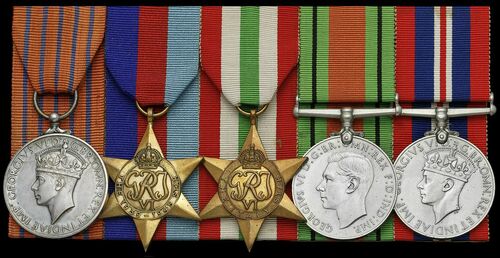
Auction: 23002 - Orders, Decorations and Medals
Lot: 107
'It was decided to attempt to clear a way through from the rear of the debris. At first glance the task appeared a hopeless one, as many attempts to remove the floorboards and beams would in all probability bring the remainder of the debris on top of the would be rescuer and the woman. However, without the slightest hesitation W.R. Young commenced to dig and scrape with his bare hands. He succeeded in burrowing a hole big enough for him to work in, and then commenced to remove the boards and beams which lay across the woman. Time and again the debris and masonry above threatened to collapse on top of the W.R. but he continued working with complete disregard for his personal safety. The whole time that the W.R. was digging enemy aircraft were active overhead, thus preventing the use of any light. After digging and scraping for almost two hours the W.R. was able to clear away sufficient space for the woman to move her legs...When the W.R. was lifted from the hole in which he had been working he was suffering badly from cramp and exhaustion and had to be assisted to a nearby house, where after a short rest, he was able to return to Balham Police Station at about 5.15 a.m., 11th May 1941.'
Statement of Junior Station Inspector W. D. F. Williams, Metropolitan Police, 13 May 1941
The impressive 'London Blitz' George Medal group of five awarded to War Reserve Constable W. H. Young, 'W' Division Metropolitan Police, who was decorated for his great gallantry on the morning of the final major Luftwaffe raid on the Capital during the Second World War
George Medal, G.VI.R. (William Henry Young); 1939-45 Star; Italy Star; Defence and War Medals, mounted court-style for display, good very fine (5)
G.M. London Gazette 29 August 1941:
'A high explosive bomb partially demolished a house and a woman was trapped. The beams and boards which were pinning her down were also holding up the debris and masonry which had fallen from above. Despite the danger, War Reserve Young burrowed a hole large enough to work in and, after two hours, managed to clear away sufficient rubble for the woman to be extracted.
In the meantime War Reserve Gordon got into the wreckage from a different direction and protected the victim from falling debris. His position was cramped and dangerous but he remained there, comforting the woman and indicating the best method of effecting her release.
An air raid was in progress during the whole operation and there was the additional danger of the house collapsing, which it did shortly after the rescue was completed. Gordon and Young showed outstanding courage and determination.'
William Henry Young was born in October 1912 at St. John's Wood in London; his birth certificate notes that his father - Herbert Arthur - was a Police Constable in 'S' Division, so perhaps family influence led William into the same calling. Newspaper and Police journal extracts also note he became very involved in extra-curricular activities with his uniformed colleagues, being a keen rower with the Balham Police Athletic Club. Living in Clapham upon the outbreak of the Second World War, and with his civilian profession noted as a 'Motor car driver', he joined the Metropolitan Police as a War Reserve Constable shortly after war was declared. Not to be confused with Special Constables, War Reserve Constables nevertheless performed a similar voluntary role alongside their civilian professions and were authorised with the same powers as Regular officers.
In the very early hours of the morning of 11 May 1941 (historically the final day of the infamous 'London Blitz') he was one of four Police officers and an Air Raid Warden who responded to the total demolition of several houses at Lyminge Gardens, Wandsworth Common by a German high-explosive bomb. Knowing a lady was alive - but trapped - inside one of the houses, Constable Young and his colleague Constable Gordon immediately set to work to free her, despite the air raid still being in progress, having no specialist equipment, and with the remainder of the building in imminent danger of complete collapse. This they achieved after two hours of undoubtedly terrifying, exhausting and back-breaking labour - the lady was saved and, as further testament to their (but especially Young's) tenacity, almost unbelievably after a short rest he then went back on duty.
Final word should perhaps go to the Commissioner of Police for the Metropolis, Air-Vice Marshal Sir Philip Woolcott Game, who wrote: 'The raid was going on during the whole operation and the two War Reserves had therefore to work in darkness. The risk they ran was shown by the fact that the house collapsed at the point where they had been working shortly after they had completed the rescue. There seems little to choose between the performances of these two men so far as regards danger. If anything, perhaps War Reserve Young had the harder task. When he finished he was exhausted and suffering from cramp, but he soon recovered and was able to resume duty...W.R.s Young and Gordon are recommended for George Medals.'
It is unknown in what capacity Young later served to earn his Second World War campaign medals. Sold with a large and comprehensive file of copied research, including reports, eye-witness statements, and newspaper articles.
Subject to 20% VAT on Buyer’s Premium. For more information please view Terms and Conditions for Buyers.
Sold for
£5,200
Starting price
£3200




